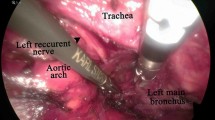Abstract
Background
Esophagectomy with three-field lymph node dissection is common, but the effects of cervical lymph node dissection on overall survival in patients with thoracic esophageal cancer remain controversial. Recently, we performed thoracoscopic esophagectomy and superior mediastinum and paracervical esophageal lymph nodes could have been effectively dissected from the thoracic cavity. This study assessed the risks and benefits of prophylactic supraclavicular lymph node dissection in patients who underwent thoracoscopic esophagectomy.
Methods
This retrospective study included 294 patients who underwent thoracoscopic esophagectomy at Kobe University Hospital and Hyogo Cancer Center between April 2010 and December 2015. Patients in the two-field (paracervical esophageal lymph nodes were dissected from the thoracic cavity) and three-field lymph node dissection groups were matched using propensity score matching. We compared overall survival and the incidence of postoperative complications in the matched cohort and assessed the estimated efficacy of additional lymphadenectomy for supraclavicular lymph node recurrence in the entire cohort.
Results
In the matched cohort, overall survival was not significantly different between the two groups, but the incidence of recurrent laryngeal nerve palsy was significantly higher in the 3FL group than in the 2FL group. In the entire cohort, 162 patients underwent a two-field lymph node dissection; 11 experienced supraclavicular nodal recurrence. We performed additional supraclavicular lymph node dissection in three patients without systemic metastasis, all of whom are alive without any other recurrence.
Conclusions
Prophylactic cervical lymph nodes dissection in thoracoscopic esophagectomy does not improve long-term survival but does increase the risk of postoperative complications.


Similar content being viewed by others
References
Jemal A, Murray T, Samuels A, et al. Cancer statistics, 2003. CA Cancer J Clin. 2003;53:5–26.
Wu PC, Posner MC. The role of surgery in the management of esophageal cancer. Lancet Oncol. 2003;4:481–8.
Igaki H, Kato H, Tachimori Y, et al. Clinicopathologic characteristics and survival of patients with clinical stage I squamous cell carcinoma of the thoracic esophagus treated with three-field lymph node dissection. Eur J Cardiothorac Surg. 2001;20:1089–94.
Akutsu Y, Kato K, Igaki H, et al. The prevalence of overall and initial lymph node metastasis in clinical T1N0 thoracic esophageal cancer: from the result of JCOG0502, a prospective multicenter study. Ann Surg. 2016;264:1009–15.
Dresner SM, Griffin SM. Pattern of recurrence following radical esophagectomy with two-field lymphadenectomy. Br J Surg. 2000;87:1426–33.
Mariette C, Balon JM, Peissen G, et al. Pattern of recurrence following complete resection of esophageal carcinoma and factors predictive of recurrent disease. Cancer. 2003;97:1616–23.
Law S, Kwont DLM, et al. Two-field dissection is enough for esophageal cancer. Dis Esophagus. 2001;14:98–103.
Watanabe H, Kato H, Tachimori Y. Significance of extended systemic lymph node dissection for thoracic esophageal carcinoma in Japan. Recent Results Cancer Res. 2000;155:123–33.
Ma GW, Situ DR, Ma QL, et al. Three-field vs two-field lymph node dissection for esophageal cancer: a meta-analysis. World J Gastroenterol. 2014;21:18022–30.
Ye T, Sun Y, Zhang Y, Zhang Y, Chen H. Three-field or two-field resection for thoracic esophageal cancer: a meta-analysis. Ann Thoracic Surg. 2013;96:1933–42.
Booka E, Takeuchi H, Nishi T, et al. The impact of postoperative complications on survivals after esophagectomy for esophageal cancer. Medicine. 2015;94:e1369.
Osugi H, Narumiya K, Kudou K. Supracarinal dissection of the oesophagus and lymphadenectomy by MIE. J Thorac Dis. 2017;9:741–50.
Oshikiri T, Nakamura T, Miura Y, et al. A new method (the “Pincers maneuver”) for lymphadenectomy along the right recurrent laryngeal nerve during thoracoscopic esophagectomy in the prone position for esophageal cancer. Surg Endosc. 2017;31:1496–504.
Rosenbaum PR, Rubin DB. The central role of the propensity score in observational studies for causal effect. Biometrika. 1983;70:41–55.
Sobin LH, Gospodarowicz MK, Wittekind C. TNM classification of malignant tumors. 7th ed. Oxford: Blackwell; 2010.
Ando N, Kato H, Igaki H, et al. A randomized trial comparing postoperative adjuvant chemotherapy with cisplatin and 5-fluorouracil versus preoperative chemotherapy for localized advanced squamous cell carcinoma of the thoracic esophagus (JCOG9907). Ann Surg Oncol. 2012;19:68–74.
Clavien PA, Barkin J, de Oliveria ML, et al. The Clavien–Dindo classification of surgical complication: five-year experience. Ann Surg. 2009;250:187–96.
Nishihara T, Hirayama K, Mori S, et al. A prospective randomized trial of extended cervical and superior mediastinal lymphadenectomy for carcinoma of the thoracic esophagus. Am J Surg. 1998;175:47–51.
Yoonjin K, Yoohwa H, Hyun-Ju L, et al. Patterns and prognostic significance of cervical lymph node metastasis and the efficacy of cervical node dissection in esophageal cancer. Korean J Thorac Cardiovasc Surg. 2017;50:329–38.
Shim YM, Kim HK, Kim K. Comparison of survival and recurrence pattern between two-field and three-field lymph node dissections for upper thoracic esophageal squamous cell carcinoma. J Thorac Oncol. 2012;5:707–12.
Taniyama Y, Miyata G, Kamei T, et al. Complications following recurrent laryngeal nerve lymph node dissection in oesophageal cancer surgery. Interact Cardiovasc Thorac Surg. 2015;20:41–6.
Deok HL, Hyeong RK, Dong KK, et al. Outcomes of cervical lymph node recurrence in patients with esophageal squamous cell carcinoma after esophagectomy with 2-field lymph node dissection. J Thorac Oncol. 2013;146:365–71.
Mine S, Watanabe M, Kumagai K, et al. Oesophagectomy with or without supraclavicular lymphadenectomy after neoadjuvant treatment for squamous cell carcinoma of the oesophagus. Br J Surg. 2018;105:1793–8.
Sihvo E, Helmeinen O, Gunn J, Sipola JOT, Reutava P, Kyoto V. Long-term outcomes following minimally invasive and open esophagectomy in Finland: population-based study. Eur J Surg Oncol. https://doi.org/10.1016/j.ejso.2018.12.001.
Author information
Authors and Affiliations
Corresponding author
Additional information
Publisher's Note
Springer Nature remains neutral with regard to jurisdictional claims in published maps and institutional affiliations.
Rights and permissions
About this article
Cite this article
Koterazawa, Y., Oshikiri, T., Takiguchi, G. et al. Prophylactic Cervical Lymph Node Dissection in Thoracoscopic Esophagectomy for Esophageal Cancer Increases Postoperative Complications and Does Not Improve Survival. Ann Surg Oncol 26, 2899–2904 (2019). https://doi.org/10.1245/s10434-019-07499-1
Received:
Published:
Issue Date:
DOI: https://doi.org/10.1245/s10434-019-07499-1




